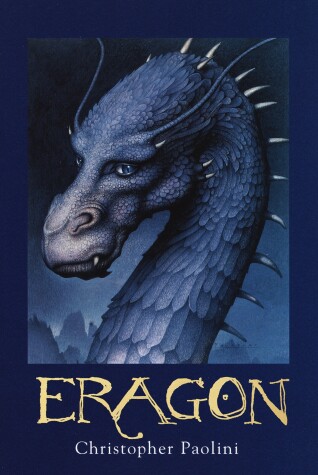Reviewed by Amber (The Literary Phoenix) on
There is a bittersweet sadness to coming back to a book I loved so much as a high schooler only to find it riddled with flaws. I want so desperately to be in love with Eragon the way I used to be, but I suppose we have to appreciate the things old stories gave us, and move forward. I will always appreciate Eragon because this is the book that got my husband reading, and it is a joy to share the things I love with him.
Foremost, the writing is overly simple. While Eragon feels like a YA story, the writing itself is on the edge of middle grade. At its most fundamental level, the transitions are clunky and the dialogue too direct. Also, too abundant? Eragon reads the best in the midst of action sequences. The battle scenes near the end of the book are the strongest scenes in the novel, and the execution of the fighting was well-done. It’s the traveling sequences I find a little more difficult to swallow. There has to be a little respect here, and it’s pretty well known Paolini was 15 when he wrote Eragon, and the book was self-published at 19. That’s awfully young for a debut, and when I hold it up to other debuts… well… the writing style makes more sense.
Where this story still succeeds is in its world building. If I remember correctly, Eragon and the Inheritance Cycle received a lot of criticism for relying on a Tolkien-esque setting. Having read a bit more epic fantasy than just The Lord of the Rings… and more from before this era, I think that some of the criticism is unfair. Just as Rowling was condemned for her reliance on mythology at the time, I think that Alagaësia is a rich fantasy world and it honors the ones that came before it without feeling too copy cat. I know others will disagree with this, but I think the depth of imagination in this world and many of its rules is gripping even now.
Eragon is a great starting point for those interested in fantasy, but just starting out. To seasoned fantasy readers, the story may feel a little stale. Nonetheless, it holds a place in my heart as an important series in my childhood, and I treasure my battered hardcover. Which I may or may not have swiped from my little brother at some point in our childhood.
___________
Original Review: Four Stars (June 2014)
I remember I first read Eragon many years ago now, and it was exciting because someone not that much older than me wrote it. Even older now, I have to admire the complexities in the series that my mind would never have been able to write at that age or even several years older, so in that way - kudos to Paolini. I can still appreciate his plot and his foreshadowing, even when I find his particular writing style a bit juvenile. But, really? He was young when he wrote the book. The wrote far more admirably than I daresay almost anyone his age could have, and for that you really must be impressed.
I'm not really one for dragon tales, but Paolini hooks you in with all the various realms of fantasy he employs. A common criticism I have heard about the series - and Eragon in particular - is his reliance on the conventional fantasy tropes. I cannot argue this. But I personally don't think those things make the book unoriginal or any less interesting. It is the elements and similarities in a story that lead us to sort them into genres, so of course some things may seem less original than others. Would a twist have been refreshing? Absolutely. But there is nothing wrong with a classic.
However, there is nothing in particular that makes Eragon memorable. The battle scenes are hazy, there is a lot of travelling. No character stands up with more strength or conviction than others of its kind. If anything at all, what makes Eragon stand out in the YA Fantasy genre is the age of its writer and its ease of reading - not to mention the rather intriguing dragon on its cover. Still, the story itself will most likely not withstand time, the way Tolkien or Rowling's work will, and that is why it gets four stars.
I own the next two books in the series and I have every intention of acquiring the fourth. The Inheritance Cycle is compelling enough that I will pick up the sequels to follow the story to its end, but the only reason I tend to reread the books is to remind myself what happened before so I am not lost when I pick up the sequels.
Reading updates
- Started reading
- 23 June, 2014: Finished reading
- 23 June, 2014: Reviewed
- Started reading
- Finished reading
- 23 June, 2014: Reviewed
- Started reading
- Finished reading
- 23 June, 2014: Reviewed
- Started reading
- Finished reading
- 23 June, 2014: Reviewed
- Started reading
- Finished reading
- 23 June, 2014: Reviewed
